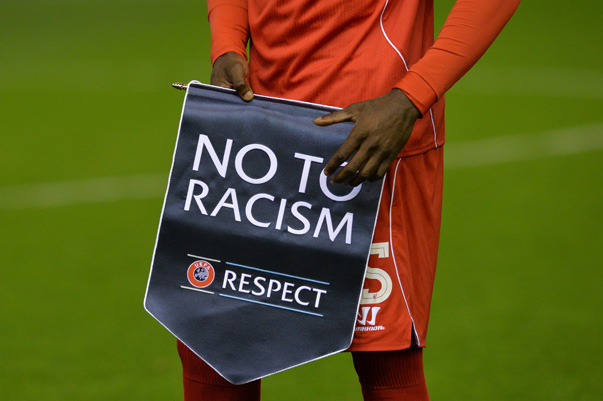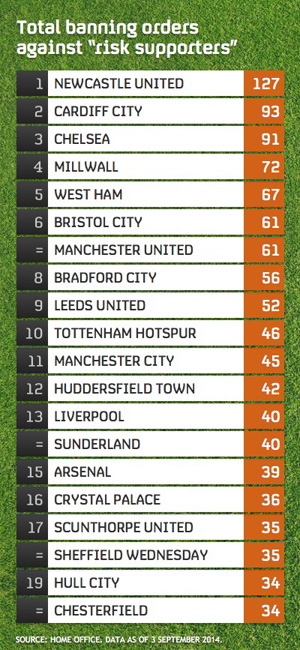
“There is no racism in football.”
Jose Mourinho, 3 October 2014
Chelsea is in the headlines today for all the wrong reasons. Supporters were filmed pushing a black man off a train on the Paris Metro then singing: “We’re racist, we’re racist. And that’s the way we like it.”
The club has strongly condemned the fans – who had presumably travelled to France to watch their team take on Paris Saint-Germain in the Champions League – and says it will ban season ticket holders who were involved. It is also appealing for witnesses to come forward.
Is this an isolated incident, or does it suggest that efforts to kick racism out of football have not yet succeeded?
Manager Jose Mourinho has been quoted as saying “there is no racism in football”.
He was talking specifically about the lack of black managers in the game, saying he did not believe colour was not a bar to success. Is there evidence that racism still taints this and other areas of the beautiful game?
On the terraces
There is a widespread belief that racist chanting is much rarer today than in the 1970s and 1980s. But statistics about the prevalence of racism on the terraces are hard to pin down.
Home Office figures show that the numbers of arrests for “racist or indecent chanting” is in decline over the 14 years we know about.
http://static.data.c4news.com/KyEvl/index.html
These statistics cover all the 92 clubs in the Premier League and the Football League as well as 30 other clubs whose supporters have been arrested. They take in all domestic and international matches involving teams from, or representing, England and Wales.
Obviously the numbers are not perfect: they include chanting that might be “indecent” but not racist, and they relate to arrests, not convictions.
And clearly, not every incident of racist chanting will lead to police involvement.
Last year a Channel 4 Dispatches team filmed Millwall, West Ham and Chelsea fans chanting Islamophobic and antisemitic insults at rival supporters. But no arrests were made, suggesting such incidents are underreported in crime statistics.
Undercover reporters reported chants to stewards and police officer at matches, only to be told later that police were not aware of any allegations of racism.
Dispatches found that, as with the Chelsea incident, a lot of the chanting took place outside football grounds. And racists were increasingly taking to the internet, with 40 per cent of the 150 black players in the Premier League subjected to some kind of online abuse over two years.
Nevertheless, the decline in recorded arrests for chanting is in line with the overall trend of less trouble at matches in general.
The total number of football-related arrests for any offence has also dwindled in recent years. The 2,273 arrests made during the 2013/14 is the lowest total on record:
http://static.data.c4news.com/lbZWv/index.html
Last season, an average of less than 1 arrest was made per match inside and outside football grounds.
Banning orders – frequently but not exclusively used against supporters as a punishment for racist abuse – are also in decline.
There were 2,273 orders in place on 3 September 2014, compared to 2,451 on 20 September 2013.
 For the record, Newcastle United had by far the most orders in place – 127 – when these stats were compiled.
For the record, Newcastle United had by far the most orders in place – 127 – when these stats were compiled.
This alternative “top tier” of those who dished out the most bans contains a number of names that will not surprise football fans.
Some clubs with a relatively small fan base appear alongside those with many more supporters in this list of shame.
On the pitch
The anti-racism group Kick it Out carried out a poll of 200 professional footballers last year.
About a third (32 per cent) of players who took part were black.
More than half the players surveyed, 57 per cent, said they had witnessed racist abuse in football stadiums and 24 per cent said they had been on the receiving end of a racial slur.
A fifth of players (20 per cent) said they had witnessed racist abuse on the training ground or in the dressing room, and 7 per cent said they had been the victim.
In the boardroom
Jose Mourinho may not believe that racism is preventing black managers from taking top jobs, but others do.
The bare facts are stark. At time of writing, there are only six black managers out of 92 teams in the Premier League and Football League.
They are: Jimmy Floyd Hasselbaink (Burton – pictured below), Keith Curle (Carlisle), Chris Powell (Huddersfield), Chris Hughton (Brighton and Hove), Fabio Liveroni (Leyton Orient) and Chris Ramsey (QPR).
And that is an improvement on a few months ago. When the Sports People’s Think Tank published this research in November last year there were only two first team managers.
At the time, about 25 per cent of professional players were black but only 3.4 per cent of people in senior coaching roles (19 out of 552 positions) were from a black or ethnic minority background.
The think-tank makes a number of recommendations, including an overall target of at least 20 per cent of coaches in professional football to be from black or minority backgrounds by 2020, and the compulsory shortlisting of black candidates for job interviews.
Some high-profile figures including Arsenal manager Arsene Wenger have argued against the introduction of quotas.
The verdict
The official figures, as far as they let us zoom in on racism on the terraces, suggest things are improving somewhat, but that racist chanting has not yet been stamped out at football grounds.
Given the absence of really good statistics, perhaps it’s better to focus on how people feel.
YouGov polling from 2013 found that as many as 91 per cent of English football fans thought that racism still existed in the domestic game.
But only 43 per cent thought it was “a serious problem”, a smaller proportion than in Italy, France, Germany and the Netherlands.
The thoughts of the players, as collected by Kick it Out, are also revealing: most say they have witnessed racism, and most support mandatory shortlisting to encourage more black coaches and managers.




